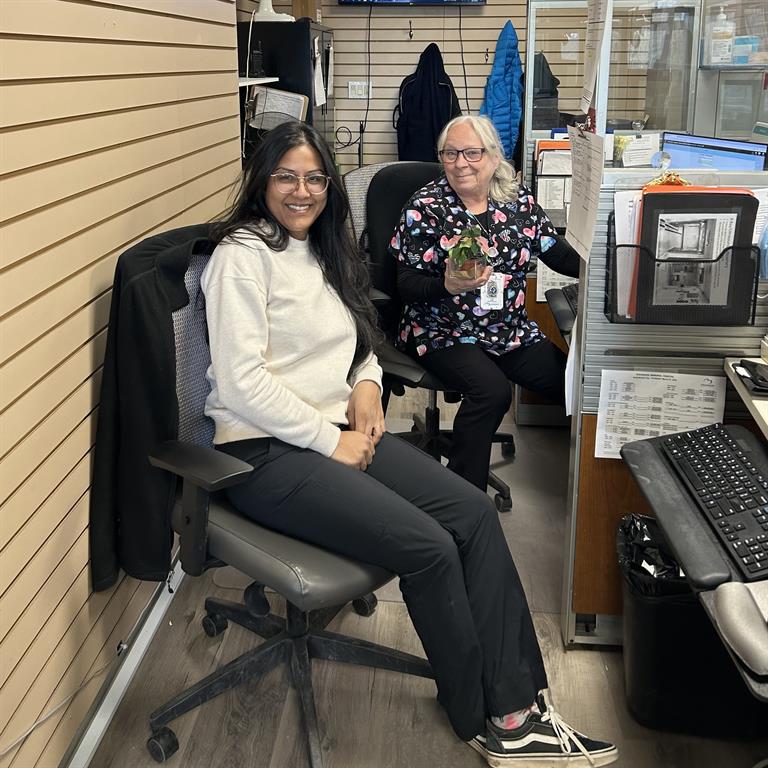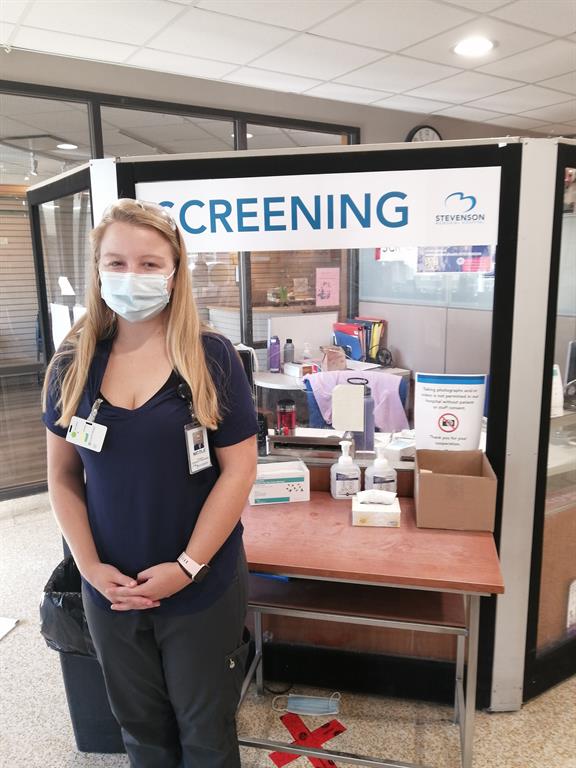Celebrating Patient Access Week: The Team Behind Every Hospital Visit
April 04, 2025
Every hospital visit begins somewhere, and at Stevenson Memorial Hospital, that first point of contact is often the Patient Access department. Whether registering patients for emergency care, admitting them for procedures, or simply answering calls, the Patient Access team plays a critical role in ensuring a smooth and welcoming experience for patients and their families.
As part of Patient Access Week, we take a closer look at this dynamic team and the work they do to keep Stevenson running efficiently through the voices of those on the front lines.
A Day in the Life of Patient Access
No two days are the same for the Patient Access team. The department handles patient admissions, discharges, and registrations while also managing the hospital switchboard, calling emergency codes, processing mail, and even overseeing security for various offices and storage areas.

Picture (left to right) Ashley Ali & Lynne Gritten
Lynne Gritten, who has been with Stevenson for 11 years, describes her days as “never ordinary or the same – it’s always different and quite varied. That’s what keeps this position fresh.” From the moment she arrives, she and her colleagues jump into action, ensuring the day's tasks are handled with efficiency and care.
Nicole Brethet echoes this sentiment. “Every day is different, and you see different patients and scenarios, which keeps you on your toes,” she says. She explains that depending on the shift, responsibilities can vary. Night shifts, for example, include preparing the switchboard log, which lists on-call personnel and their contact details—a crucial resource for overnight operations.

Portrait of Nicole Brethet
The First Point of Contact
Patient Access clerks are often the first faces that patients and families see when they arrive at Stevenson. This initial interaction can set the tone for the rest of a patient's experience.
Ashley Ali, who has been with Stevenson for nine months, emphasizes the importance of this role. “I always try to maintain a positive and understanding attitude,” she says.
Gritten agrees, noting the weight of that responsibility. “It sets the tone for their interactions with other staff,” she explains. “Very often, we can take a frightened or upset patient and calm them down to a level of understanding that helps them get through their issue with more confidence.”
Brethet adds that being kind and welcoming is key. “If I were to come into any hospital and be yelled at or talked down to, I wouldn’t want any further care in that hospital,” she says. “Therefore, I try to be the very best version of myself not only to patients and families but to everyone I work with as well.”
The Challenges of the Role
While rewarding, working in Patient Access comes with its challenges. Dealing with distressed, frustrated, or aggressive patients can be difficult, but the team is well-trained in de-escalation and problem-solving.
Brethet acknowledges that emotions can run high in a hospital setting, whether due to a patient's illness or concerns about a loved one. “I try my best to help them or tone down the situation, so they understand that we are here to help them,” she says.
Beyond patient interactions, technical challenges can also arise. “When the printer goes down or the system crashes, you need to stay calm, focused, and rely on your training,” says Gritten.
The Skills That Make a Difference
Patience, empathy, and strong organizational skills are essential traits for success in this fast-paced department.
“Patience, empathy, organization, and the ability to multi-task are important in this role,” says Ali. “We have a strong team here at Patient Access, which makes it easy to stay organized—everything flows when everyone is on the same page and working as a team.”
Gritten highlights the importance of balancing technical expertise with soft skills. “Solid knowledge of hard skills ensures competency and the ability to get the task at hand done, but soft skills—your ability to work effectively with all levels of personnel and patients—are just as crucial.”
Moments of Pride
Despite the challenges, the team finds immense satisfaction in their work. For many, the moments that stand out are those where they’ve made a meaningful difference in a patient’s experience.
“For me, it’s patient testimonials that are the most memorable,” says Gritten. “They are always inspiring and reaffirming as to why SMH is a great place to work.”
Brethet recalls a time when she helped a patient who had forgotten their requisition for an appointment. “I told the patient to email the requisition to my work email, and then I printed it off for them,” she says. “They were very happy, and they made it to their appointment on time.”

A Career in Patient Access
For those considering a career in Patient Access, the team has plenty of advice.
“You’ll love it,” says Gritten. “It’s the gateway to what’s going on in all departments and how much you contribute to each one’s success. Everyone at one time or another depends on you for correct and speedy information.”
Brethet advises newcomers to stay focused and take it one step at a time. “You can only do as much as you can, but make it the best work you can. Always be kind and understanding.”
Ali highlights the importance of teamwork and adaptability. “Things are always evolving. It helps to work with a great team that is always open to changes.”
The Heart of Stevenson Memorial Hospital
More than just a department, Patient Access is a team of dedicated individuals who bring compassion, efficiency, and resilience to their roles every day. They are the welcoming voices and faces that help patients navigate their healthcare journeys. This Patient Access Week, we celebrate them—not just for the work they do but for the care, kindness, and dedication they bring to Stevenson Memorial Hospital and the community it serves.